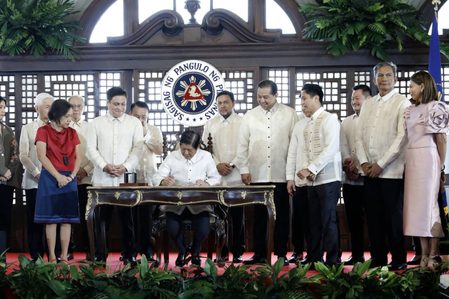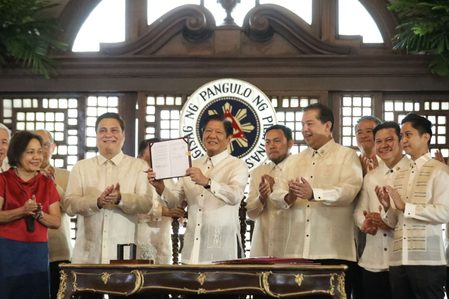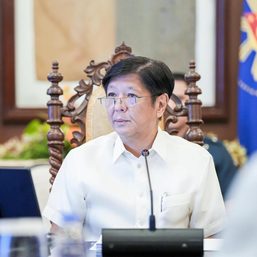SUMMARY
This is AI generated summarization, which may have errors. For context, always refer to the full article.

MANILA, Philippines – Even before President Marcos Jr. named corporate finance veteran Rafael Consing Jr. as president and chief executive officer of the Maharlika Investment Corporation (MIC), he was already involved in setting the direction of the controversial wealth fund, press releases of Malacañang showed.
When Marcos changed the implementing rules and regulations (IRR) of the Maharlika Fund dated November 10, Consing was among those named as having attended the meeting. He was there in his capacity as Marcos’ adviser for investment and economic affairs.
That meeting resulted in Marcos signing off on tweaks, including the striking out of stringent appointment requirements for the MIC chief and giving the President authority to reject nominees for MIC president and CEO in the short list provided by an advisory body.
Consing went on to express his support for the revisions as they granted “flexibility.”
Had it not been for the relaxation of requirements, it appears that Consing would not have qualified for the post, which he officially got on Monday, November 13, because he did not have the academic credentials. He, however, has a wealth of experience in finance and wealth management.
Qualifications
The old IRR had a long list of qualifications for the MIC’s president and CEO (PCEO), with Marcos required to appoint someone with an advanced degree or a masters or PhD in finance, economics, business, or a related field. Additional certifications as a chartered financial analyst or certified public accountant were also listed as preferences. The official must also have at least 10 years of management experience.
Consing only has a bachelor’s degree in political science, which he obtained at the De la Salle University in 1989.
The highest postgraduate studies he listed in his CV is an executive education course at Stanford in 2016, where he attended a strategic financial leadership program tailored for chief financial officers. Stanford offers the pricey three-month course for $27,500 or around P1.5 million.
But with the new IRR, Consing is more than qualified, as the updated one reduced minimum educational and work experience requirements. From an advanced degree, the new IRR simply asks the President to appoint someone with “exceptional experience and expertise” in corporate management and finance with at least 10 years of work experience in a related field.
Monetary Board Member and former National Treasurer Rosalia de Leon said the reason for removing the qualifications in the IRR was to give “more independence to the Board in determining the specific qualifications of the other officers of the MIC in order to carry out its mandate to efficiently manage the MIF.”
“The President wants the Board to be insulated from political influence and considerations and would like to give the leeway to set the qualifications in the best way they know how based on their experience and expertise in fund management,” De Leon said.
Consing was described by Malacañang as someone who is “accomplished and results-driven” with a “profound depth of experience” in corporate finance.
Prior to his appointment in government service as Marcos’ adviser in January 2023, he held high-profile positions in the private sector, most notably as senior vice president and chief financial officer of Enrique Razon’s International Container Terminal Services Incorporated (ICTSI).
During his 15-year stint there, he bagged various awards while working on the most critical and mundane aspects of the port operator, including capital structuring, management and execution, treasury and risk management, and corporate finance.
He also held director roles at HSBC Hong Kong and HSBC Singapore and focused on the debt capital markets, currency debt products, and Sharia-compliant bonds.
His first role in corporate treasury was vice president and treasurer at Aboitiz Equity Ventures.
He also held positions at Bankers Trust Company and Multinational Bancorporation, where he gained experience in investment banking and derivatives.
Changes
Based on Malacañang’s press releases, Consing supported the amendments prior to his appointment.
In a November 12 news release or just a day before Consing’s appointment, he expressed his support for the revised IRR, which lists fewer specific responsibilities for its audit and risk management committees while also greatly reducing the educational and professional experience requirements for the fund company’s top positions.
“In respect of the Audit Committee, the old IRR specifically outlined the membership of the committee which involved two senior executives of the MIC. It is important to remember that its primary purpose is to provide independent oversight of the company’s financial reporting process,” Consing said.
“Including senior executives on the Audit Committee raises the risk that investors and the public may perceive the committee as being biased towards management and could undermine the committee’s independence and credibility. Thus, it is not advisable for companies to include senior executives in Board Audit Committees,” he added.
The revised IRR also stripped multiple sections of specific safeguards, effectively giving the MIC board more power on what the audit and risk management committees will do.
Consing asserted that the revised IRR was not the appropriate forum for outlining specific rules on board risk management oversight as it is only intended “to provide general guidance” on the implementation of the MIC and “not to prescribe specific rules and procedures” for its operation.
“If the Revised MIC IRR outlines specific rules on board risk management oversight, it could restrict the flexibility of the first set of incoming Board of Directors of MIC to develop a risk management system that is best suited for the company,” Consing said.
Prior to his appointment, Consing addressed capital concerns of state-run Development Bank of the Philippines (DBP) and the Landbank of the Philippines (Landbank) after pouring in billions for the wealth fund. He stood firm, noting that the banks can rebuild their capital through retained earnings.
Consing said both DBP and Landbank can further raise a variety of bonds to boost their liquidity, and issue instruments in both the domestic and global capital markets to enhance their capital position and mitigate their capital deficiency.
“Both DBP and Landbank have strong track records in accessing the global capital market. And I have no doubt that international investors will continue to support them,” Consing said.
Opposition lawmaker France Castro believes Consing isn’t fully qualified for the post, and stressed the importance of having an MIC chief who has an advanced degree in finance, economics, business or related field.
“Financial corporation kasi ‘yun kaya dapat maalam at mayroon talagang expertise. Hindi naman expertise ‘yung mga leadership program na inattendan niya. Kaya tingin natin ay hindi gaanong qualified para maghawak ng ganitong kalaking financial…kung baga GOCC [Government-Owned or -Controlled Corporation] ito, financial corporation sa ating bansa, considering ang laki-laki ng capital na ilalagak dito,” the party-list representative of the Alliance of Concerned Teachers told radio DWPM on Tuesday, November 14.
(This is a financial corporation so there should be knowledge and real experitise. The leadership programs he attended do not mean expertise. So he’s not so qualified to hold this big financial…GOCC, financial corporation in the country, given that so much capital will be deposited into it.)
She also raised the issue of possible conflict of interest, given Consing’s previous positions in various companies, especially tycoon Razon’s ICTSI.
In a press conference on Wednesday, November 15, Consing denied the IRR was revised to accommodate his appointment.
“By putting in those qualifications [in the draft IRR], it had the effect of amending the law, which is not the intention. So what they did was they simply brought it back and aligned it with what the law actually said, and that was not just applicable to the PCEO. It was similarly applicable to all members of the board, be it regular or independent,” he said.
Challenges
Consing will have to effectively entice investors to put cash in Maharlika, which was heavily criticized by some of the Philippines’ top economists.
A strongly worded discussion paper by the University of the Philippines School of Economics earlier said Maharlika violated the very “principles of economics and finance” as it lacked a clear focus, seeking both commercial returns and investment of huge portions of its funds in local development projects.
It is also notable that none of the Philippines’ major business groups have expressed support for Maharlika, even after the provision on using pension funds was stricken out.
Meanwhile, the Maharlika will be launched at a time when sovereign wealth funds are missing targets amid global uncertainties.
For instance, Australia’s sovereign wealth fund missed its return target and warned real returns would continue to trend lower than in recent decades because of further possible policy tightening by global central banks to contain inflation.
The roughly $130-billion Future Fund said its main portfolio returned 6.3% on its investments, below its self-imposed target of 9.4%, for the 12 months ended September 30. For the September quarter, the fund suffered a negative return of 0.5%.
“Investment markets are going through a challenging period with falling share prices and bond investors pricing in higher long-term interest rates,” Chair Peter Costello said in a Reuters report.
“Looking ahead, the key issues remain the extent of further monetary policy tightening required to bring inflation back within central bank targets, how markets respond to those measures and whether the Israel-Gaza conflict turns into a wider regional war.”
Norway’s $1.4-trillion sovereign wealth fund, the world’s largest, posted a $33.80 billion loss in the third quarter after sustaining heavy drops in the value of equities and bonds.
The fund’s return on investment was minus 2.1% for the July-September period. Equities – its biggest asset class, accounting for 70.6% of its value in the quarter – recorded a 2.1% loss. Fixed income investments, which account for just above another quarter of its assets, returned a loss of 2.2%, and real estate assets of 3.3%.
The broad-based nature of the decline “maybe indicates that there is a little bit of a fundamental macro factor driving this and…one would point to the continued rising interest rates,” Deputy CEO Trond Grande told Reuters. – Rappler.com
Add a comment
How does this make you feel?








![[ANALYSIS] The political divorce rocking the Philippines](https://www.rappler.com/tachyon/2024/07/TL-duterte-marcos-china-US-feud-july-4-2024.png?resize=257%2C257&crop=303px%2C0px%2C720px%2C720px)




There are no comments yet. Add your comment to start the conversation.